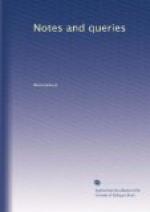“Thou wast nother Erasmus nor Luter;
Thou dyds medle no forther than thy potte;
Agaynst hye matters thou wast no disputer,
Amonge the Innocentes electe was thy lotte:
Glad mayst thou be thou haddyst that knotte,
For many foolys by the[e]
thynke them selfe none,
Yet all be nott dead, though
thou be gone.”
The next stanza speaks of “Dye Apguylamys,” who is told to prepare the obsequy for Love, and of “Lady Apylton,” who had offered a “mass-penny,” and the epitaph ends with these stanzas:
“Now, Love, Love! God have
mercy on thy mery nowle;
And Love! God have mercye on thy
foolysche face,
And Love! God have mercye on thy
innocent sowle,
Which amonges innocentes, I am sure, hath
a place,
Or ellys thy sowle ys yn a hevy case;
Ye, ye, and moo foolys many
[a] one,
For foolys be alyve, Love,
though thou be gone.
“Now, God have mercye on us all,
For wyse and folysche all dyethe,
Lett us truly to our myndes call;
And to say we be wyse owr dedes denyethe,
Wherefore the ende my reason thys aplyethe:
God amend all foolys that
thynke them selfe none,
For many be alyve, thoughe
Love be gone.”
It is very possible that I have overlooked some common source of information to which I may be referred; and it is very possible also, that this epitaph has been reprinted in comparatively modern times, and I may not know of it. This is one of the points I wish to ascertain.
J. PAYNE COLLIER.
[Was there no such person
as Love, and does the writer mean merely
to pun upon the word?
Cupid certainly played the fool in the court
of Henry VIII. as much
as any body.]
* * * * *
MARE DE SAHAM—POSTUM PUSILLUM—WATEWICH.
I am much obliged by J.F.M’s answers respecting those places. If he will look to the Historia Eliensis, lib. ii. c. 84, 85. vol. i. pp. 200-204. (Anglia Christiana), he may be certain whether or not he has correctly designated them. He may at the same time, if he be well acquainted with Cambridgeshire, give me the modern interpretation for Watewich, also mentioned in chap. 84. of the Hist. Eliens.
W.B.M.
* * * * *
THE ADVENT BELLS.
The Advent bells are ringing in many parishes throughout various parts of England during this month of December, if I may judge from my own neighbourhood—on the western borders of Berks—where, at least three times in the week, I hear their merry peals break gladsomely upon the dark stillness of these cold evenings, from many a steeple around. In the Roman States and the kingdom of Naples and Sicily, the “pifferari” go about playing on a kind of rough hautboy and bag-pipes, before the pictures of the Madonna, hung up at the corners of streets and in shops, all through Advent time; but why are the church bells rung in England? What reference in ancient documents can be pointed out for the meaning or antiquity of the usage?




